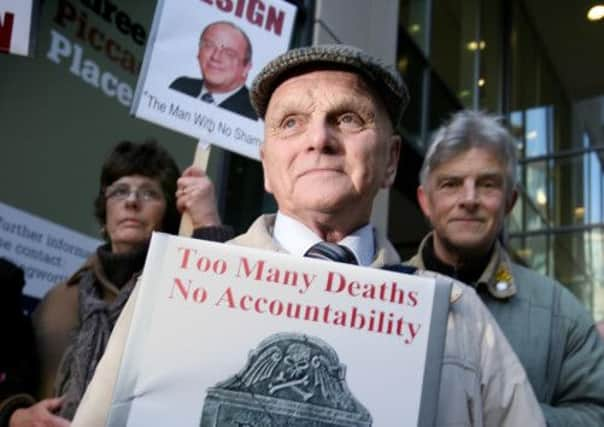Jayne Dowle: Small step towards curing the ills of the NHS


In recent years aviation has reversed its appalling record to reduce fatalities. “Zero harm” should be the aim for the NHS too, says this former advisor to Barack Obama, who is regarded as an international authority in his field.
The appointment of Professor Berwick comes in the aftermath of the tragedy at Mid Staffordshire NHS Foundation Trust, where up to 1,200 people died due to neglect. It is this level of institutional neglect which he will concern himself with predominately, seeking out those darkest corners of the NHS where patients have been abandoned, left to suffer and die.
Advertisement
Hide AdAdvertisement
Hide AdWhat happened at Mid Staffordshire was a failing of the greatest proportions. However, as many of us know to our cost, it is not the only hospital to have turned its back on its patients. This is why we should welcome the fact that the Professor is here and means business. The “zero harm panel” he is heading will report its findings to the NHS Commissioning Board and the Department of Health at the end of July.
Some people will argue that we don’t need an American, especially one who contributed to the huge controversy President Barack Obama suffered over healthcare reforms, coming over here telling us what to do with our own NHS.
To that, I’d argue that we must be pragmatic. It is clear that despite years of warnings, investigations and reports, nothing of lasting significance has been achieved either internally, or by a succession of health ministers, to stop the rot.
Anything which causes the NHS to examine itself has got to be welcomed by patients, doctors, nurses and support staff. That is why I say, fasten your seatbelts. This is not going to be a comfortable process, and it comes at a time when the NHS is already in turmoil.
Advertisement
Hide AdAdvertisement
Hide AdNot only is it undergoing fundamental change to its organisation and structure, with the GP-led reforms about to be implemented next month, but it is also under scrutiny from us all.
The brave families who spoke up about the failures at Mid Staffordshire have made us ask questions. And many of us are asking now what we, as a country, expect the NHS to deliver for us, the people who rely on its services.
This analysis is a two-way process. Each of us must decide whether our expectations from a National Health Service are realistic in the modern world. The paternalistic relationship which for decades we took for granted has been blown to smithereens.
The next time you’re sitting there in the GP’s surgery looking for a way to pass the time, I suggest you have a think about this. The curious thing about the NHS is that it delivers a service that is intensely personal, often tailored directly to you, the individual. Whether that service is good, bad, indifferent or downright dangerous is dependent on many factors, but the point is, every time any of us use it, we are at the mercy of so much which is beyond our control.
Advertisement
Hide AdAdvertisement
Hide AdTake the issue of antibiotics, for example. Only this week, the Chief Medical Officer, Sally Davies, warned that urgent action is needed to tackle the “catastrophic” threat of global antibiotic resistance.
When you demand an antibiotic to get rid of that stubborn cold, even though you know, and the doctor knows, that it’s a virus which will eventually go away, do you think that you could be contributing to potential global catastrophe? Of course you don’t – you just want to feel better.
Yet, as Sally Davies points out, growing resistance to antibiotics means that in 20 years’ time, even routine operations could become unsafe for patients, who may be susceptible to untreatable infections.
She calls for 17 recommendations to regulate the use of antibiotics, including better training for GPs. It is obvious that, like so many things in the NHS, prescription guidelines have been allowed to slip. This has implications for patient safety, and this matters.
Advertisement
Hide AdAdvertisement
Hide AdOf course, it is a long way from patients pestering for antibiotics to tackling the kind of institutional failures responsible for the horrific death toll at Mid Staffordshire.
Yet both these extremes remind us that the NHS is subject to a constant process of cause and effect, and we, the patients, are at the heart of it.
We cannot take it for granted any longer, either in the basic provision of its services, nor the quality of the care that it offers – everything is up for question. Professor Berwick says that there is “some enormous illness in the system”.
He is right. Tackling the root causes of that illness is going to take longer than five months, but his arrival is taking off in the right direction.